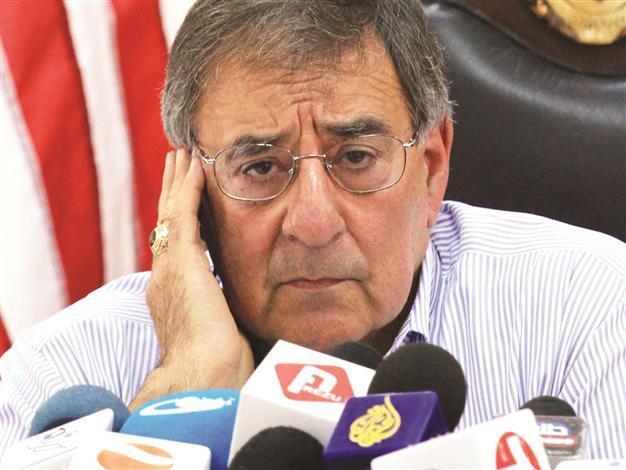No patience for Pakistan: Washington
KABUL

US Defense Secretary Panetta warns of more drone attacks in Pakistan. EPA photo
U.S. Secretary of Defense Leon Panetta warned Pakistan yesterday that the United States was losing patience with Pakistan’s refusal to eliminate safe havens in its territory for insurgents who attack U.S. troops in neighboring Afghanistan.Panetta lashed out at Pakistan and the al-Qaeda-linked Haqqani network during a brief visit to Kabul, which was overshadowed by fury over a NATO air strike that allegedly killed 18 civilians, an issue that the Pentagon chief did not address in public. Panetta left Kabul less than five hours after his arrival, as Afghan President Hamid Karzai cut short a trip to Beijing and headed home in response to the deaths of around 40 civilians June 6 due to the air strike and a suicide bombing.
The Haqqani group, a faction linked to the Taliban and al-Qaeda that is believed to be based in Pakistan’s lawless tribal district of North Waziristan, is blamed for some of the deadliest attacks in Afghanistan’s 10-year war.
“It’s an increasing concern that this safe haven exists and that there are those like the Haqqanis who are making use of that to attack our forces,” Panetta said, speaking at a joint news conference with his Afghan counterpart, Abdul Rahim Wardak. “We are reaching the limits of our patience here. For that reason, it’s extremely important that Pakistan takes action to prevent this kind of safe haven from taking place and from allowing terrorists to use their country as a safety net in order to conduct their attacks on our forces. We have made that very clear time and time again and we will continue to do that. But as I said, we are reaching the limits of our patience.”
Karzai rebukes NATO
Panetta’s explicit and repeated criticism of Pakistan’s inaction, which he also voiced on his visit to India, appeared to signal a tougher stance and a suggestion that the U.S. was becoming even more willing to strike militant targets inside Pakistan. A senior U.S. official acknowledged that the recent increase in drone strikes on insurgents in Pakistan is due in part to frustration with Islamabad. Washington said the attacks were crucial to drive out militants, and emphasized that four days ago a U.S. drone strike in northwest Pakistan killed al-Qaeda’s second-ranking leader, Abu Yahya al-Libi. Speaking in Istanbul at the Global Counterterrorism Forum, Secretary of State Hillary Clinton also implicitly defended Washington’s use of drone strikes to kill suspected militants.
The two countries are also at odds over the closure of NATO supply routes that run through Pakistan. Pakistan shut down the southern supply routes six months ago, after U.S. airstrikes killed 24 Pakistani soldiers at two border posts.
The Afghan president, who was attending a meeting of the Shanghai Cooperation Organization in Beijing, issued a stinging rebuke of NATO’s latest air strike. “Attacks by NATO that cause life and property losses to civilians under no circumstances could be justified and are not acceptable,” Karzai said of the incident on June 6 in Logar province, south of Kabul.
Panetta also told U.S. troops in a speech at the heavily fortified Kabul airport that the decade-long war was at “a turning point.” He sought to reassure soldiers that their sacrifices had not been in vain and Afghans that NATO’s drawdown did not mean they would be abandoned.
Compiled from AFP and AP stories by the Daily News staff.
















